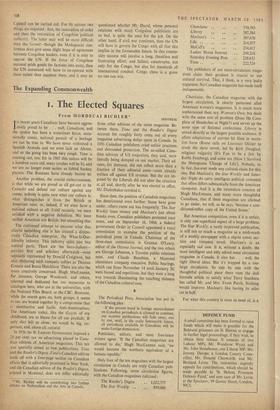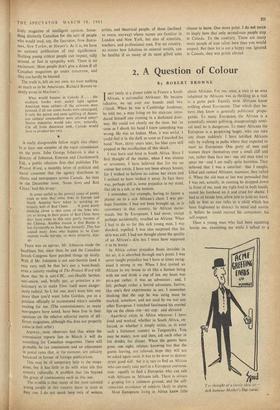The Expanding Commonwealth
1. The Elected Squares
From MORDECAI RICHLER*
MONTREAL
IN recent years Canadians have become aggres- sively proud to be . . . well, Canadians, and the upshot has been a sometimes fierce, occa- sionally comic, national pursuit of a heritage we can be true to. We have never withstood a Spanish Armada and we even lack an Alamo, and so the going has been very rough. Time :s running out, too, for in 1967 this nation will be a hundred years old, many torches will be lit, and we are no longer even secure as fabled hockey players. The Russians have already beaten us.
Another problem, the crucial embarrassment, is that while we are proud as all get-out to be Canucks and defend our culture against any corner, nobody is quite sure what our culture is, what distinguishes it from the British or American ones, or, indeed, if we even have a national culture at all. Until recently, we were satisfied with a negative definition. We were neither American nor British, but something else.
The continued attempt to uncover what that elusive something else is has created a distinc- tively Canadian enterprise, the What-Is-Our- Identity industry. This industry splits into two natural parts. There are the hero-makers- patriots first and scholars afterwards—most seriously represented by Donald Creighton, but also sheltering such romantic softies as Thomas Costain and Bruce Hutchison. There are also the more creatively concerned. Hugh MacLennan, for instance, George Woodcock, and others, talented and dedicated but too numerous to catalogue here, who are at the universities, with the National Film Board, or the CBC. However, while the search goes on, both groups, it seems to me, are bound together by a compromise that is unattractive and facile. Anti-Americanism. The Americans today, like the Goyim of my childhood, are to blame for all our pratfalls. If only they left us alone, we would be big, im- portant, and, above all, cultural.
In 1956 the St. Laurent Government imposed a 20 per cent. tax on advertising placed in Cana- dian editions of American magazines. This tax was specially aimed at two publications, Time and the Reader's Digest. Time's Canadian edition leads off with a four-page section on Canadian affairs that is editorially processed in New York, and the Canadian edition of the Reader's Digest, printed in Montreal, does not differ editorially * Mr. Richler will be contributing two further articles on Nationalism and the Arts in Canada. from other editions of the same magazine. Be- tween them, Time and the Reader's Digest account for roughly forty cents out of every magazine advertising dollar spent in Canada. In 1956 Canadian publishers cried unfair practices and demanded protection. The so-called Cana- dian editions of US magazines, they said, were literally being dumped on our market. Their ad. rates, for instance, did not reflect more than a fraction of their editorial costs—costs already written off against US revenue. But the tax im- posed by the Liberals did not alter the situation at all and, shortly after he was elected to office, Mr. Diefenbaker revoked it.
Since then, the position of Canadian magazines has deteriorated even further. Some have gone under, others come out less frequently. The Star Weekly loses money and Maclean's just about breaks even. Canadian publishers protested once more, and on September 16, 1960, a federal government Order in Council appointed a royal commission to examine the position of the periodical press in Canada. Chairman of the three-man commission is Grattan O'Leary, editor of the Ottawa Journal, and the two others are George Johnston, a Toronto public relations man, and Claude Beaubien, a Montreal aluminium company executive. Public hearings, which ran from November 14 until January 20, were biased and repetitious, but they went a long way towards illuminating the touching thinness of the Canadian cultural case.
The Periodical Press Association has put in the following plea : lithe present trend in foreign encroachment on Canadian periodicals is allowed to continue, our member publications will fade away, one by one, until, in the easily foreseeable future, all periodicals available to Canadians will be under foreign domination.
Publishers, editors, and most free-lance writers agree. 'If the Canadian magazines are allowed to die,' Hugh MacLennan said, 'we would become the northern equivalent of a banana republic.'
Only four of the ten magazines with the largest circulation in Canada are truly Canadian pub- lications. Following, some circulation figures, with the Canadian magazines italicised; The Reader's Digest .. 1,022,377 The Star Weekly .. 950,000 Chatelaine • •
• •
Liberty • • • • Maclean's • • 759,583 587,584 507,670 Life .. • • • •
• •
314,977 McCall's
• •
254,617 Ladies' Home Journal 249,216 Saturday Evening Post
• •
228,653 Time ..
• •
222,724 The publishers of our mass-circulation maga- zines claim their produce is crucial to our cultural survival. That, I think, is a very leaky argument. No Canadian magazine has made itself indispensable.
Chatelaine, the Canadian magazine with the largest circulation, is clearly patterned after American women's magazines. It is much more sophisticated than, say, Woman's Own, but deals with the same sort of problem (Does He Com- plain of Headaches at Night?) and serves up the same type of fictional confections. Liberty is aimed directly at the largest possible audience. It offers adaptations of current hit films in narra- tive form (Rome calls on Laurence Olivier to crush the slave revolt, led by Kirk Douglas), religious vulgarity (It's Fun to be a Jew by Rabbi Feinberg), and some sex (How I Survived the Menopause 'Change of Life'). Nobody, to be fair, has ever made any cultural claim for this one. But Maclean's, the Star Weekly and Satur- day Night do carry intelligent political comment that often differs substantially from the American viewpoint. And it is the immediate concern of Hugh MacLennan, and many more thoughtful Canadians, that if these magazines are allowed to go under, we will, as he says, 'become a con- ditioned-reflex copy of the United States.'
But American competition, even if it is unfair, is only one superficial aspect of a large problem. The Star Weekly, a vastly improved publication, is still not so much a magazine as a mish-mash of a weekly newspaper with a slip-in comic sec- tion and romance novel. Maclean's is an especially sad case. It is, without a doubt, the most intelligent and ably edited mass circulation magazine in Canada. It also has . . . well, the right liberal ideas. But it's trapped by a too- large circulation. So side by side with the thoughtful political piece there runs the dull formula article to satisfy what Terry Southern has called Mr. and Mrs. Front Porch. Nothing would improve Maclean's like having its sales cut in half.
For what this country is most in need of, is a lively magazine of intelligent opinion. Some- thing distinctly Canadian for the sort of people Who would read, say, the Spectator, New States- man, New Yorker, or Harper's. As it is, we have no national publication of teal significance. Nothing young critical people can respect, rally around, or feel in sympathy with. There is no excitement. Most people don't give a damn if all Canadian magazines go under tomorrow, and they can hardly be blamed.
The truth is, left on our own, we want nothing so much as to be Americans. Richard Rovere re- cently wrote in Maclean's:
What would happen in Canada if . . . the southern border were sealed tight against American mass culture—if the airwaves were jammed, if all our comic books were embargoed, if only the purest and most uplifting of Ameri- can cultural commodities were allowed entry? Native industries would take over, naturally. Cut off from American junk, Canada would have to produce her own. . . .
A really disagreeable fellow might also object to at least one member of the royal commission on the press. John George Johnston is also a director of Johnston, Everson and Charlesworth Ltd., a public relations firm that publishes The Printed Word, a monthly letter of political and social comment that the agency distributes to clients and newspapers across Canada. An item in the December issue, 'Some Jews and Red China,' had this to say : It seems useful to the general cause of public truth to note that some Jews in Europe and North America have taken to speaking ex- tremely well of Red China. . . . A point worth thinking about is that some of the Jews who are so strong in their praise of Red China these days have come to this only partly because of the Chinese. Another reason is that Russia is less favourable to Jews than formerly. Jrhis has caused many Jews who happen to be Com- munists o.do nip-ups, or more properly, nips- There was an uproar, Mr. Johnston made the headlines, but, since then, he and the Canadian Jewish Congress have patched things up nicely. Well, if Mr. Johnston is not anti-Semitic (and it may very well be that he's just a bone-head), even a cursory reading of The Printed Word will show that he is anti-CBC, anti-Health Service, anti-union, and, briefly put, so primitive a re- actionary as to make Time itself seem danger- ously radical. So I, for one, don't want him, any more than you'd want John Gordon, put in a Position officially to recommend what's suitable reading for me. (The commissioners, as many newspapers have noted, have been free in their Opinions on the relative editorial merits of dif- ferent magazines, although this does not properly come in their orbit.) Anyway, most observers feel that when the commission reports late in March it will do something for Canadian magazines. There will probably be tax concessions and an adjustment in postal rates that, at the moment, are unfairly balanced in favour of foreign publications.
This may be of temporary help to the maga- zines., but it has little to do with what ails this country culturally. A problem that lies beyond the grasp of commissions such as this one.
The trouble is that many of the most talented Young people in this country leave as soon as they can, I do not speak here only of writers,
artists, and theatrical people, of those (inclined to roam, anyway) whose names are familiar in London and New York, but also of scientists, teachers, and professional men. For no country, no matter how fabulous its mineral wealth, can be healthy if so many of its most gifted sons
choose to leave. One more point. I do not mean to imply here that only second-rate people stay in Canada. To the contrary. There are many more people of true talent here than you would suspect. But their lot is not a happy one. Ignored in Canada, they win prizes abroad.







































 Previous page
Previous page